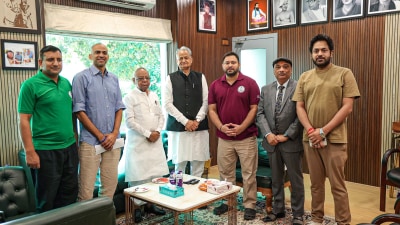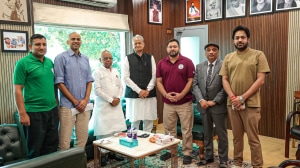Gandhi’s Gujarati dictionary gets its first rewrite to include pizza, Internet
Blue film, dating, friendship belt—not words that one associates with Mahatma Gandhi. But three-quarters of a century after the Mahatma...

Blue film, dating, friendship belt—not words that one associates with Mahatma Gandhi. But three-quarters of a century after the Mahatma conceived and oversaw the first authoritative dictionary on Gujarati spelling, it is being updated. And these words are being added to Saarth Jodni Kosh, along with pizza, Internet and yellow journalism.
The meticulous Mahatma constituted a committee to work on the dictionary after noticing that people mixed up their matras and took liberty with their spelling (jodni). Gujarati was not standardised those days but Gandhiji wanted to change that. And since the kosh (dictionary) included meanings (arth) of words, it was rather predictably called Saarth Jodni Kosh.
Once the dictionary was completed in 1929, Gandhiji had magisterially declared, ‘‘Henceforth, no one has the right to spell at will.’’ Wayward spellers got another rap in 1940 when the erstwhile Bombay state announced that only those textbooks that followed the Kosh would be eligible for grants.
But over time, the world evolved beyond the scope of the dictionary. To reinforce the Gandhian rigour on Gujarati, linguist Mohanbhai Patel started updating it in 1998. But he died in 2002 and a 13-member committee appointed by Gujarat Vidyapith had to take over the baton. It hopes to publish the 5,000-odd new words as a supplement by this year-end. Had all these additions come from the Gujarati language alone, their task would have been simpler. The foreign influence has not spared Gandhiji’s land and the committee has had to include some words from Hindi, English and even Bengali that are now used commonly in Gujarat.
Some purists are upset. ‘‘Giving validity to these foreign words will only turn Gujarati into a khichdi (hotch-potch), which is not good for the language,’’ says Chunibhai Vaidya, former editor of the fortnightly Bhoomiputra.
But committee members insist that a dictionary should reflect language as it is used, and point to English as a tongue that has become popular by assimilating words from everywhere. Says Dr Shilin Shukla, who is working on the supplement: ‘‘Words by themselves are not vulgar so we are not against expressions like ‘blue film’ or ‘dating’.’’
Another committee member, Chandrakant Sheth, adds: ‘‘Since newspapers use these words, why shouldn’t a dictionary include them? We want to make the dictionary as practical as possible.’’ Normally, it would have required the tact of a Gandhi to settle this brewing dispute. But support for the dictionary comes from an unexpected quarter. Keka Shastri, noted linguist, scholar, and founder of the Vishwa Hindu Parishad (VHP) in Gujarat, believes that the committee is on the right track.
Shastri may have crossed the age of 100 but he welcomes change. ‘‘New words should be included, and one cannot have any objection to foreign words,’’ he said. Gandhiji would have agreed—in chaste Gujarati.






- 01
- 02
- 03
- 04
- 05

























